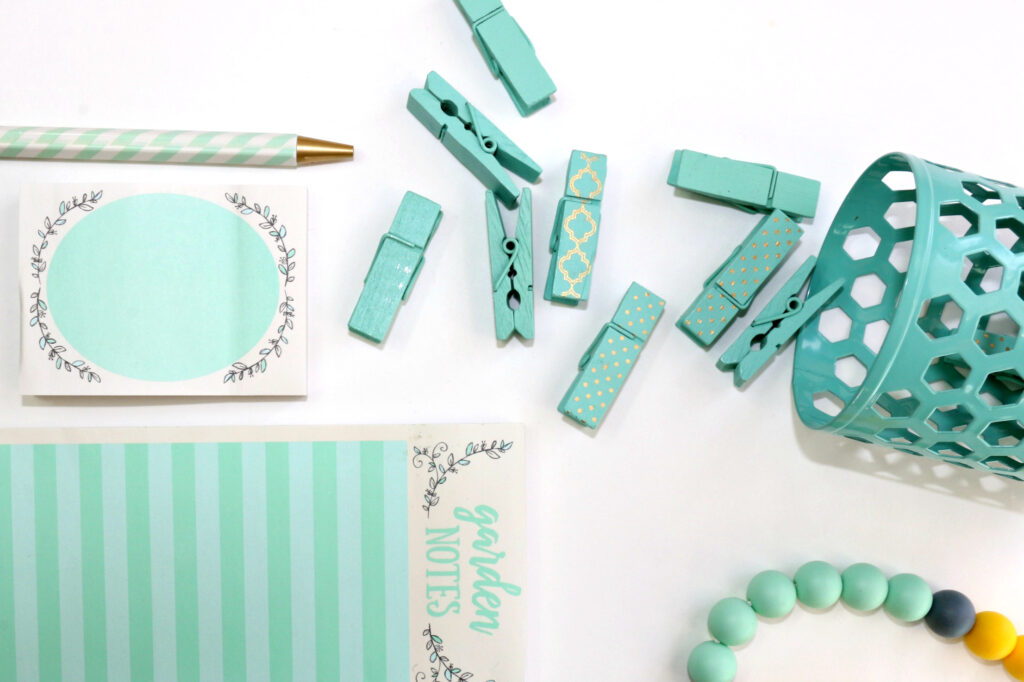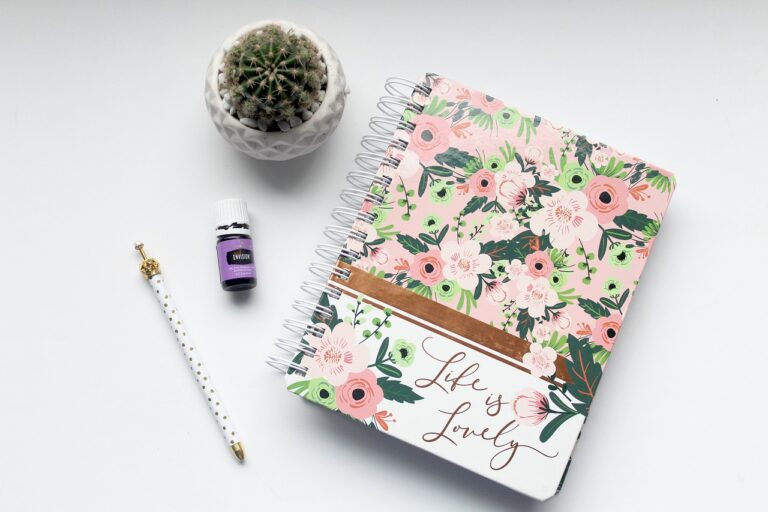8 Practical Tips to Help You Build Habits That Stick: A Guide for Moms
This post may contain affiliate links, which means I’ll receive a commission if you purchase through my links (at no extra cost to you). Please see my disclosure for more information.
Moms are some of the busiest people on the planet. Juggling work, children, and a million other things can be overwhelming, and it’s easy to feel like you’re not doing anything well.
Beyond the everyday stuff that you deal with, you have goals. Sometimes they’re big, hairy, audacious goals like writing a book or running a marathon. Sometimes they’re more of the everyday variety – goals like keeping your house clean, taking care of yourself, and feeding your family healthy meals.
The best way to achieve these goals is to hammer away at them bit by bit, in small steps taken daily. And the easiest way to take those small steps every single day is to build habits that stick.
A habit is any routine or behavior that is repeated regularly and tends to occur subconsciously. From the definition alone, I think it’s pretty easy to see how habits can help you with productivity! Subconscious cleaning? Automatic exercising? Sign me up for that!
In this guide, you’ll learn why habits are important, how habits are formed, and how you can create new habits that make your life easier. I’ll also cover how to deal with bad habits so you can ditch them for good!

Why Are Habits Important?
Habits are important for many reasons, but one of the biggest ones is that they help simplify our lives.
Habits can also help us achieve our goals. As an obvious example, if you want to lose weight, then forming a habit of eating healthy food and exercising every day will help you achieve that goal.
We don’t have to think about each individual step we take when we do something regularly – instead, our brains can rely on autopilot. This leaves us with more brainpower to focus on other things, such as spending quality time with our families – which ultimately makes us happier and healthier!
A Little Secret About Habit-Forming
Your “why” is what ultimately motivates you to create habits that last.
You can try to make changes in your life by building a hundred new habits, but your new habits aren’t likely to stick unless you know why you want or need to create them in the first place.
The hardest part is getting down to the true why. Most of the time, our reasons for doing something just aren’t meaningful enough to flip that switch inside of us that inspires us to finally make a change.
This is why smokers don’t quit until they have a serious health crisis. Or why alcoholics and drug addicts don’t stop until they hit “rock bottom” – the point where the why suddenly becomes enough to cause lasting change.
You need to define what’s actually important to you, which is usually different from what you think is important at first glance.
Let’s use starting a business as an example. Why would you want to start a business? Well, it’s generally to bring in an income, whether part-time or full-time. But usually that’s not enough of a motivator to get you to build those habits that will make your business endeavor successful.
So you need to dig deeper. Why is the additional income important? So you can provide for your family, whether it’s to help pay the bills or to provide the fun stuff, like vacations, sports, or the latest tech toys – right?
But sometimes, even that’s not deep enough.
If you’re struggling to come up with a why that truly inspires you, consider the possibility that what you’re trying to accomplish isn’t actually that important to you. That doesn’t mean you shouldn’t make the change, but it might mean that your time right now would be better spent focusing on something different.
Until you can attach your goal to a reason, it’s unlikely you’ll create a true habit – one that is so ingrained in your subconscious that you do whatever it is without even thinking about it.

How to Create New Habits That Stick
You don’t need super-human willpower to form a new habit, but you do need patience. And discipline. And you need to have this patience and discipline consistently for anywhere from 3 weeks to 2 months, which is approximately how long it takes to form a new habit.
But you only need this patience and discipline until you’ve formed your new habit. Once you’ve made a habit out of something, you can scoot along on autopilot – no more willpower necessary!
The reality is that building good habits does take time and effort. Here are some tips and tricks that will make the process easier.
#1 – Choose Your Habit
What is it that you want? To lose weight? Have a cleaner house? Finally start that blog? Choose a habit that will help you get there.
A habit is easier to create when it’s specific. Instead of “drink more water,” try “drink 60 oz of water per day.” If you’re starting from zero, instead of “exercise every day,” try “do a 20-minute yoga video on Tuesdays and Thursdays.”
Bonus – go as far as naming the time of day as well. You could do your yoga videos on Tuesdays and Thursdays right when you get home from dropping the kids off at school or right when you wake up in the morning.
Start small, especially if this is your first go-round, and work on only one habit at a time. You can always add another once you’ve gotten the hang of the first.
#2 – Commit For At Least A Month
Since it can take anywhere between 3 weeks and 2 months (per the experts) to form a new habit, you have to give it a real shot.
I like to commit for a month. In forming new habits, I’ve found that it does get easier after the first couple of weeks, even if it’s not fully ingrained yet. The struggle of the first few days won’t last long, but you still have to keep going so you don’t lose progress.
#3 – Don’t Skip Two Days in a Row
When you’re forming a new habit, the most difficult thing is sticking to it for long enough that it becomes a true habit. If you’ve ever tried to establish a workout habit, you know that your drive usually wears off as soon as you experience your first sore morning. You skip a couple of days until your legs don’t feel like jelly anymore, and the next thing you know, you’ve stopped completely.
Skipping one day probably won’t have a huge impact on your long-term goals. You shouldn’t expect perfection. It’s okay to skip a day and then get right back on track.
Skipping two days, however, is a different story. On that third day, it’s that much easier to not work out. On the fourth day, forget about it.
When you’re trying to build a new habit, it’s crucial that you don’t skip two days in a row!
#4 – Attach Your New Habit to An Existing Habit
Making a new habit part of your daily routine will help you remember to do your new habit in the first place. Here are some examples:
- Work out every morning right when you walk in the door from dropping the kids off at school.
- Every morning after you grab your cup of coffee, leave your phone in the kitchen while you sit down and read for 30 minutes.
- Keep a gratitude journal on your nightstand, and write down 5 things you’re grateful for right when you lie down at night.
#5 – Greenlight Your Future Self
I’m pretty sure this phrase came from Matthew McConaughey’s book, but I didn’t read it. My husband did, and he uses the phrase all the time now, and I love it.
Make it easy on yourself by setting up for your new habit in advance. Other people call these “habit ramps” – what are some things you can do ahead of time that will help you build and maintain this new habit?
Let’s use the examples from above:
- Exercise: Put on your workout clothes in the morning before you take the kids to school so that you’re all set to work out right when you get home. Better yet, lay out those clothes the night before so that your groggy morning self doesn’t have to remember that you’re supposed to work out.
- Reading: Put the coffee grounds and water in the coffee maker the night before, and set your mug and your book on the counter right next to it. Seeing the book in the morning will trigger the reminder that you’re supposed to read while you have your coffee, rather than scroll the socials.
- Gratitude journal: Keep your journal on top of your nightstand, along with a pen.
Greenlight your future self as much as you possibly can, and I’m certain you’ll find that it’s easier to remember your new habits!
#6 – Be Prepared for Obstacles and Temptations
Consider the obstacles and temptations that will likely get in your way as you work toward forming your new habit.
Yes, unfortunately this can happen no matter how closely you tie your habit to your routine.
Make “if-then” plans for as many of them as you can think of so that you’ll be prepared for them as you work toward achieving your goals.
As an example: What will you do if the kids have a snow day and you don’t have to drop them off at school? How can you still get that workout in?
Or what if the baby wakes up early and you aren’t able to get your 30 minutes of reading done in the morning while you have your coffee?
Think ahead so that you don’t have an excuse to just not do your habit.
If you do end up stumbling at an obstacle or giving into temptation, don’t be too hard on yourself – just figure out a way to get back on track and keep building that habit!
#7 – Track Your Progress
Anytime you’re working on something meaningful, find a visual way to track your progress.
There are a bajillion free printable habit trackers out there – The Petite Planner has compiled a list of some super cute ones. I particularly like the 100 Day Habit Tracker that’s on the list 🙂
Another option that I’ve seen and love is to put a sticker on your calendar every day you stick to the new habit. Or even just mark your calendar in some way to show your progress.
Make it fun and make it pretty to look at!
#8 – Celebrate Your Wins!
Implement a reward system into your tracking to help you lock in your new habits and celebrate your successes along the way. Include your family – it’s more fun to celebrate with others than alone!
Your reward doesn’t have to be big, but it should be something that feels special. It can be simple, like allowing yourself 15 minutes of social media after an hour of work. It can be more extravagant, like a dinner out with your family after you earn your first $100 from your Etsy shop.
A reward can be anything you want it to be! The important part here is to be clear about it from the first day you start your new habit – it’s nice to have something to look forward to!
#9 – Keep Going
Congratulations! Your new habit is now part of your lifestyle! Keep up the great work 🙂
But What About Breaking Bad Habits?
I know – we’re near the end of the post, and you’re probably saying, “Yeah, Karis, that’s all fine and good, but what I’m really wondering is how to break my bad habits!”
There are two parts to this answer:
- Replace your bad habit with a good habit. For example, if you want to stop eating junk food after dinner, put a bowl of something healthier on the counter, like fruit or veggies. If you want to stop having a glass of wine every night, make a cup of tea instead.
- Figure out if you’re a moderator or an abstainer. This will help you figure out if you can sometimes give in to your bad habit or if you need to keep away entirely and forever.
You’re most likely a moderator if you find that an occasional “treat” heightens your pleasure and strengthens your resolve. Or if you panic at the thought of never again having whatever it is you’re trying to stay away from.
You’re most likely an abstainer if you have trouble stopping once you’ve started or if you aren’t tempted by things you’ve decided are off-limits.
Which do you think you are?
It’s not all or nothing – you can be an abstainer with chocolate and a moderator with coffee. The exception is that, for an actual addiction – smoking, drugs, or alcohol – abstaining is typically the only solution.

Further Reading on Habits

If you want to develop a new habit, then today is the day and now is the time. Don’t wait for the “right time” to start something new, because it will never come.
Start NOW. The sooner you start, the sooner your new habit will be established.
Habits are hard to make AND hard to break. It takes time. Know why you’re doing what you’re doing, and focus on small wins – you’ll get to where you want to be in no time!
What new habit will you start with? Share in the comments below!












